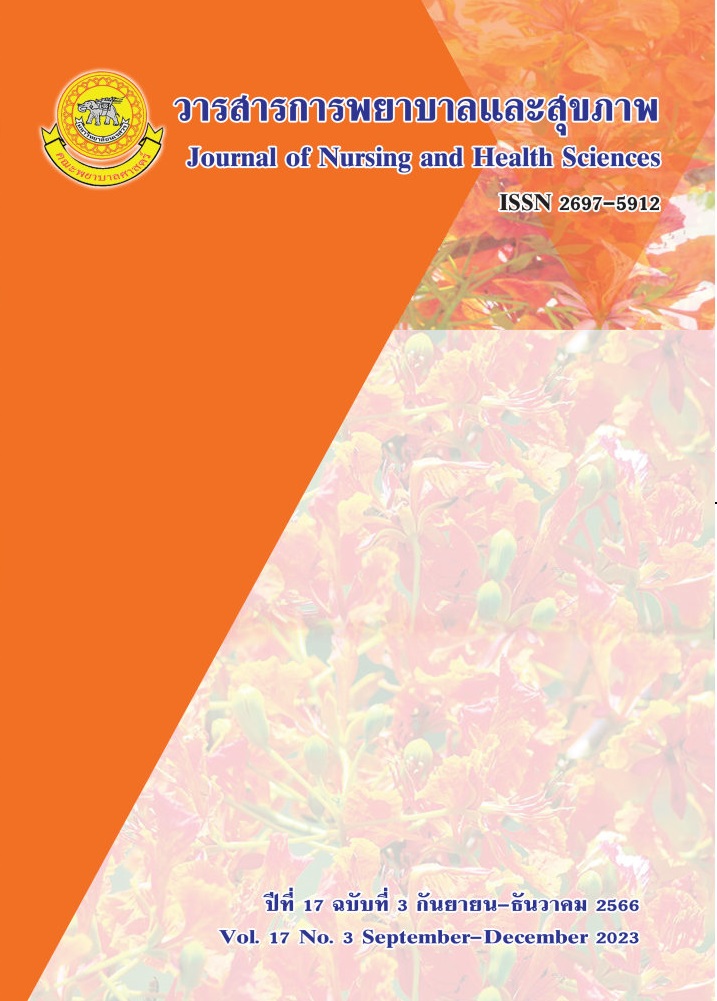The Effect of Flipped Classroom Technique on Nursing Students’ Knowledge and Self-Efficacy in Nursing for Pregnant Women Infected with COVID-19
Main Article Content
Abstract
The flipped classroom teaching technique is one method of Active Learning, focusing on the students build knowledge based on their own skills, information, abilities, and intelligence. This one-group pretest-posttest design research aimed to compare nursing students’ knowledge and self-efficacy in nursing pregnant women infected with COVID-19 before and after applying the flipped classroom teaching technique. The population were nursing students registered for Maternal-child and midwifery practicum subject in the first semester of the academic year 2021. The samples were 45 nursing students selected by using a purposive sampling technique. Research tools composed of 1) ) questionnaire of knowledge in nursing care of pregnant women infected with COVID-19 and the reliability of KR-21 were 0.780, and 3) questionnaire of self-efficacy perception of nursing students. The reliability of cronbach’s alpha coefficient were 0. 950. Data were analyzed by descriptive statistics and paired simple t-test. The results revealed that after using the flipped classroom teaching technique, the nursing students had significantly higher mean scores of required knowledge and self-efficacy perception in nursing care of pregnant women infected with COVID-19 than those of before using flipped classroom technique (p-value < .05). The suggestion for further research is that the flipped classroom applied in online formats could be a highly useful resource for designing active learning environments in which university students could improve their knowledge and sense of self-efficacy.
Article Details

This work is licensed under a Creative Commons Attribution-NonCommercial-NoDerivatives 4.0 International License.
References
Amornpaisarnloet, W. (2020). The views of Thai preservice teachers to a flipped classroom approach towards teaching a special education course. Walailak journal of learning innovations. 6(1), 107-125. [In Thai].
Campillo-Ferrer, J. M., & Miralles-Martinez, P. (2021).Effectiveness of the flipped classroom model on students' self-reported motivation and learning during the COVID-19 pandemic. Humanities and social sciences communications. Retrieved 23 July 2022 from https://doi.org/10.1057/s41599-021-00860-4
Fallah, T., Hafezi, C.F., Makvandi, B., & Bavi, S.(2020). The effectiveness of flipped classroom technique in promoting academic motivation and self-efficacy among students. Iranian Journal of Learning and Memory, 3 (11), 69-75.Retrieved 17 April 2023 from https://doi.org/10.22034/iepa.2021.245649.1203
Fan, J. Y., Tseng, Y. J., Chao, L. F., Chen, S. L., & Jane,S. W. (2020). Learning outcomes of a flipped classroom teaching approach in an adult-health nursing course: a quasi-experimental study. BMC medical education,18;20(1):317 Retrieved 23 July 2022 from. https://doi.org/10.1186/s12909-020-02240-z. PMID: 32948178; PMCID: PMC7501708.
Hwang, G-J., Yin, C., & Chu, H-C. (2019). The era of flipped learning: promoting active learning and higher order thinking with innovative flipped learning strategies and supporting systems. Interactive Learning Environments,27(8), 991-994, Retrieved 23 February 2023 from https://doi.org/10.1080/10494820.2019.1667150
Kruachottikul, S., & Oatme, S. (2020). The effects of using role -playing to self- efficiency in maternal-child nursing and midwifery I student nurses of Saint Louis college. Journal of health and health management. 6(2), 28-39. [In Thai].
Latorre-Cosculluela, C., Suarez, C., Quiroga, S., AnzanoOto, S., Lira-Rodriguez, E., & Salamanca-Villate,A. (2022). Facilitating self-efficacy in university students: an interactive approach with Flipped Classroom. Higher Education Research &Development, 41, 1603-1617.
Namaziandost, E., & Cakmak, F. (2020). An account of EFL learners' self-efficacy and gender in the Flipped Classroom Model. Education and Information Technologies . 25, 4041-4055.Retrieved 17 April 2023 from https://doi.org/10.1007/s10639-020-10167-7
Namaziandost, E., Tilwani, S. A., Khodayari, S.M., Ziafar, M., & Alekasir, S. (2020). Flipped classroom model and self-efficacy in an
Iranian English as a foreign language context:A gender-based study. Journal of University Teaching & Learning Practice. 17(5)Retrieved 17 April 2020from https://ro.uow.edu.au/jutlp/vol17/iss5/17
Odklun, P., Mongkonsukontharuk, S., &Sakulkoo, P.(2021). Learning achievement and opinions on the Learning management based on the flipped classroom of the first-year nursing students.Journal of graduate school. 18(81). 114-124.[In Thai].
Phupong, V. (2020). Coronavirus disease-19 and pregnancy. Thai journal of obstetrics and gynaecology. 28(2), 66-70. [In Thai].
Pulbutra, P., Saramunee, K., Anusornsangiam, W.,Cushnie, B., & Jaruchotikamol, A. (2017).Effects of flipped classroom learning model in the lessons on pharmacology of anti-diabetic agents in pharmacy students at Mahasarakham University. Thai journal of pharmacy practice.9(2). 422-432. [In Thai].
Rasmussen, S. A., Smulian, J. S., Lednicky, J. A.,Wen, T. S., & Jamieson, D. J. (2020). Coronavirus Disease 2019 (COVID-19) and pregnancy: what obstetricians need to know. American journal of obstetrics & gynecology, 415-426. Retrieved July 23, 2022 from https://doi.org/10.1016/j.ajog.2020.02.017
Sithsungnoen, C. (2017). Flipped classroom: learning skill in century 21. Journal of MCU social science. 6(2 special editions), 171-182. [In Thai].
Srihiran, V. (2017). Critical thinking with flipped classroom. Graduate studies journal. 13(65).19-28.[In Thai].
The Royal Thai College of Obstetricians and Gynaecologists. (2021). Clinical practice guideline management of Covid-19 infection
in pregnancy. Retrieved July 23, 2022 from https://covid19.dms.go.th/backend/Content/Content_File/Covid_Health/Attach/25630324214133PM_CPG-Covid-Preg-20Mar20.pdf
Tang, T., Abuhmaid, A. M., Olaimat, M., Oudat, D. M.,Aldhaeebi, M., & Bamanger, E. (2020). Efficiency of flipped classroom with online-based teaching under COVID-19.Interactive learning environments.Retrieved 23 July 2022 from https://doi. org/10.1080/10494820.2020.1817761
Ministry of Education , Thailand (2017). The Higher Education Committee. The announcementof the Ministry of Education: Qualifications bachelor's degree in nursing 2017. Bangkok: Ministry of Education; 2017. [In Thai]
Youhasan, P., Chen, Y., Lyndon, M., & Henning, M. A.(2021). Exploring the pedagogical design features of the flipped classroom in undergraduate nursing education: a systematic review. BMC nursing,20(1), 50. https://doi.org/10.1186/s12912-021-00555-w
Zafarghandi, M. S. (2018). The effect of flip learning on students' self-efficacy and academic achievement. Retrieved 17 April 2023 from https://ssrn.com/abstract=3154001


